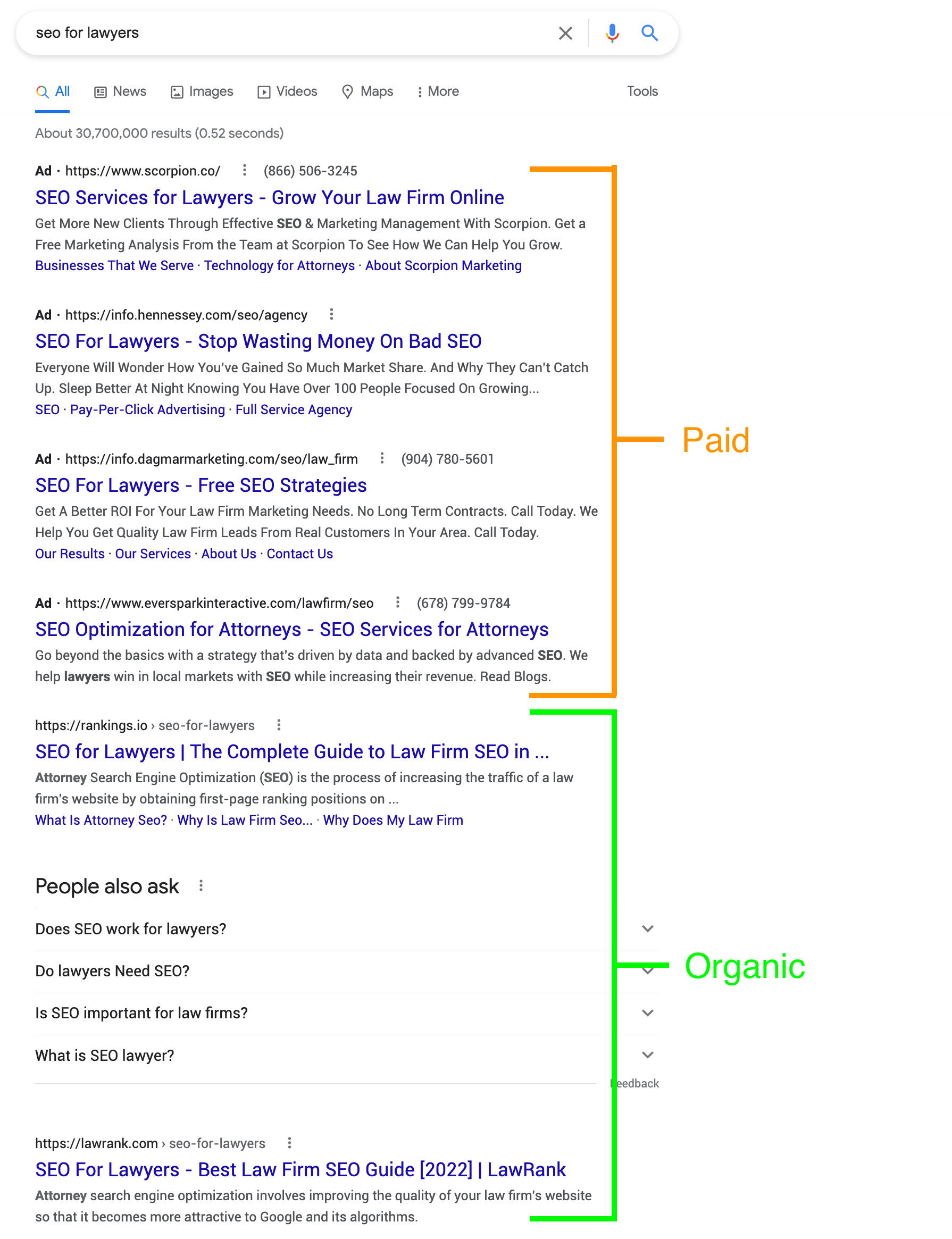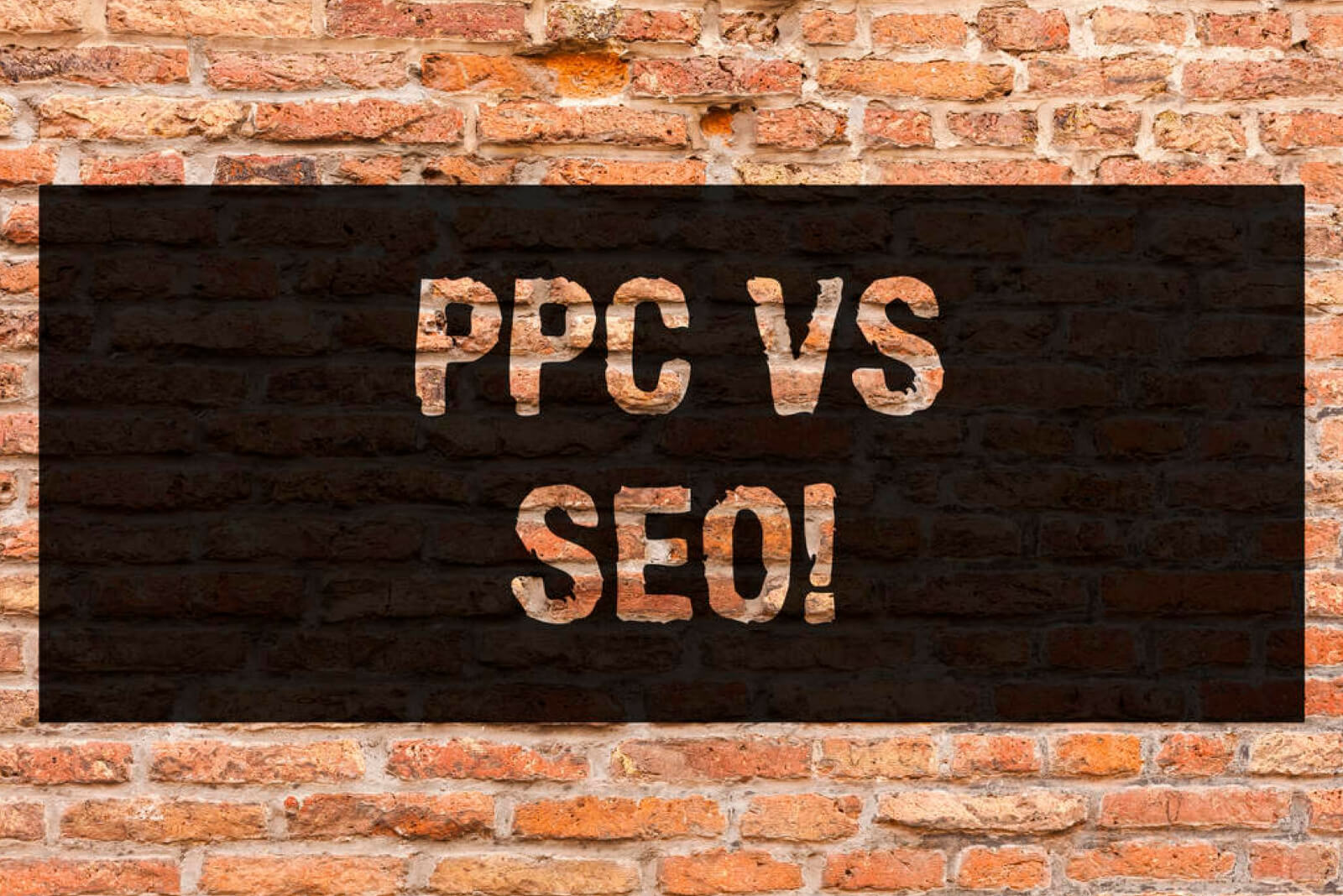You’ve probably heard the term “SEO” before. These days, it seems to be a big buzzword. People throw it around left and right, and you’re just supposed to “get” what it means and what it does. Don’t worry if you don’t get it, that’s what the LHTWO team is here for. SEO is much more than just a buzzword and we know that. You also know that, and that’s exactly the reason you’re doing research on SEO for lawyers and reading this article written by my team and I.
You may have heard other lawyers talking about gaining more clients through law firm SEO strategy, and you’re curious about how you can replicate their success with SEO for yourself. Look no further than this article – because we break it all down for you.
What Is SEO?
Contrary to popular belief (in SEO agencies), SEO isn’t hard to learn or practice. Some SEO agencies really double down on the difficulty of ranking your website through SEO practices, but as long as you know which aspects you need to put all SEO efforts into, you don’t need an agency. So, what is SEO and what does it entail? SEO stands for Search Engine Optimization. SEO is a set of practices designed to improve (or optimize) the appearance and positioning of web pages in organic search results within a search engine. That’s a sentence full of information. Let’s break it down for you.
A search engine is a software system that is designed to carry out web searches. Here are a few search engines that we know and love to give you some context: Google, DuckDuckGo, Bing, and Yahoo. To find this article, you searched something along the lines of “SEO for Lawyers” in your preferred search engine, and our article popped up for you on the first page, and that’s why you clicked it. Our article is positioned on the first page as the first or second result BECAUSE we have optimized our website and content to diligently follow the proper SEO practices.
Most major SEO guidelines within each search engine are the same, but each search engine has different algorithms and fine-line details which can change the way your site is ranked across a wide range of platforms. Don’t get us wrong, there’s more to SEO than just optimizing your web pages and providing useful and relevant content. Oftentimes, SEO is broken down into three different parts:
- Organic Search Results – organic search results are unpaid listings on a search engine results page (SERP) that the engine has determined are most relevant to the user’s search query.
- Pay-per-click (PPC) ads lead. They’re always displayed before organic search results. However, organic search results are distinct and different from PPC ads as organic search results are positioned based on the search engine’s organic ranking algorithms, rather than advertiser bids. You can’t pay for your page to rank higher in organic search results compared to PPC ads.

- Organic Traffic Quality – the quality of organic traffic has to do with how relevant or similar the user and their search query are to the content that exists on your website.
- High-quality traffic includes visitors who are genuinely interested in your products, services, or content your site has to offer. High-quality SEO practices capitalize on the search engine’s effort to match a user’s search to the website listed in the search engine page results.
- Organic Traffic Quantity – the quantity of organic traffic you receive has to do with the number of users who reach your site from organic search results.
- Most users are more likely to click on search results that appear near the top of the search engine page, which is why it’s important to utilize SEO practices to rank your website pages as high as you can.
So, all in all, SEO entails optimizing your website and your content best for the search engine to produce organic search results for anyone looking for your content. Taking organic search results, organic traffic quality, and organic traffic quantity into consideration when optimizing your content and website for search engine optimization will be key in determining how well your website ranks.
How Does SEO Work?

Search engines want to be useful to their users by giving them a good user experience. They want to provide the best service to their users. This means delivering search results that are high-quality and relevant to the search query that a user enters. In order to provide the best quality content to each search query, search engines have to scan, crawl and index different websites to understand what the site is about. Search engines crawl your website by sending an internet bot to browse and take note of your website and the content that lives on your website. Crawling and taking an index of your website helps them down the line when they need to deliver relevant results to those who are searching for certain pieces of content.
That’s why SEO is important. SEO is the process website owners go through to make sure their site ranks high in search engines when users are searching for relevant keywords or search phrases. Appearing at the top of search engine results for specific online searches will increase your website visits, provide more connections with potential clients, and potentially land you some high-quality cases. The more you have opportunities to come across people who need your help, the more opportunities you have to take on a new client within your practice.
Google uses an algorithm to determine what pages to show for any search term. Sometimes, there can be a very wide range of ranking factors that Google’s algorithm has to sift through to determine the search engine result pages for a specific search query. We’re probably going to sound like a broken track record, but this is why it’s important to get as specific as you can with your content to increase the likelihood of your website ranking highly on a search query. There are three core factors that search engines utilize to determine the quality of a site and how it should rank:
- Links – how many links are being directed from other websites to your website. An established website linking to your webpage can be seen as a vote of quality and confidence in your website because typically website owners are unlikely to link to other sites if they’re of poor quality.
- Content – how high-quality and relevant the content of your website is. Search engines will analyze the content of your web pages to determine if it’s relevant for any given search term.
- Page structure – how the content on your web page is structured. The way a web page is structured can impact the search engine’s ability to evaluate a page. Having a web page that isn’t structured well can negatively impact your website because search engines won’t be able to read it.
The Benefits of SEO For Lawyers
You may be reading through this article thinking “I kind of get SEO now… but how can SEO and knowing the best practices of SEO help me and my firm?” That’s an easy question to answer.
When you’re aware of what SEO is and have guidelines for SEO whilst you’re setting up or updating the content of your website, you’re already a step closer to reaping the benefits of ranking organically. Knowing the best practices for SEO will give you a guideline on the way you write and present content on your website, which will, in turn, help you rank for certain keywords and search phrases.
5 Benefits of SEO For Lawyers
As you may already know, lawyers and firms are a bit limited in the way they can advertise their services. A lawyer can rank organically through SEO or pay for PPC ads to advertise their firm to a general audience. However, they’re not permitted to directly target a specific person or group that needs legal services for a certain matter. That’s where law firm SEO comes into play. When marketing their services to a general audience, law firms are permitted to receive and respond to general information requests. Basically, lawyers can advertise their services, but they are prohibited from soliciting their services or creating customer profiles to advertise to a specific market or niche.
That leads us to the 5 obvious benefits SEO can give a lawyer or law firm website:
- SEO for law firms is a cost-effective and sustainable option. Following best practices and selecting target keywords that are easy to rank in can pay off more than PPC advertising. It takes a bit more time and effort because SEO is a long-term marketing plan, but it’s more low-cost than PPC ads.
- Having a high-quality SEO strategy can snowball into being found online locally and attracting more local traffic. Search engines personalize results based on a user’s search history, device, and current location when a search query is entered. In fact, a user’s location is the most important SERP modifier. Even if you’re not ranking on a country-wide level, you can still rank on a city-wide level, and that in itself can bring you significant returns.
- SEO generates organic traffic to your site. Targetting low-volume search phrases can help you rank on less competitive keywords which can bring you more potential clients. A good way to generate organic traffic is to look for low-volume search phrases (through a service like SerpStat) and write a blog or content piece for that search phrase. When it’s less competitive and you have a good basis for SEO, you’ll be able to dominate any low-volume search phrase. When your site is ranking and showing at the top of the search engine results, anyone who enters the search phrase you have chosen will naturally gravitate towards your website. You can also track the efficacy of your web content by installing Google Analytics on your website to see how the users visiting your website are reacting to your website.
- Law firm SEO increases awareness of your firm. Many people who are looking for a service like yours may not know you even exist. Having an SEO-friendly website, focusing on producing high-quality content, and having an online presence, through a Google My Business or Google Maps listing, will help draw eyes toward you and your business. Search engines scan the entire web through “crawlers,” which are automatically programmed internet robots that Google uses to find, review and track new content uploaded to the search engine. These crawlers automatically connect your website, content, Google My Business listing, and any other social media accounts you have to establish your online presence. The more high-quality your online presence is, the easier it is to rank higher and gain more awareness. Long story short, you should definitely maintain your firm’s online presence.
- Last but not least, maintaining your firm’s online presence is the easiest way to establish the credibility of your firm’s services. Having a space where people can easily find more information on your firm is the biggest way to close a new potential client. Having a Google My Business profile, which also helps with how your website is ranking, also allows your previous clients to leave online reviews and personal recommendations for future clients to read. Make sure you keep your clients happy enough to leave a positive personal review so that anyone who is looking for a reason to pull the trigger definitely will after reading a positive review from your firm’s services.
The Difference Between SEO and PPC Advertising

We talked a little bit about what PPC advertising is and that it differs from executing an SEO strategy. So, what are the big differences? SEO is a long game approach; why not just pay a higher price and go the “easy route” with PPC advertising since you get faster returns? It completely depends on what you’re looking for when marketing your business.
PPC advertising campaigns and long-term SEO strategies are completely different approaches to attracting new potential clients. SEO strategies focus on driving organic traffic to your website while PPC advertising is about displaying paid ads on the top of search engine results pages. Let’s take a look at some of the advantages and disadvantages of SEO marketing and PPC advertising:
SEO Pros
- Raises your brand’s awareness
- Establishes your brand’s credibility
- Cost-effective online marketing method
SEO Cons
- Lot’s of competition in common search phrases and keywords
- SEO is dynamic and constantly changing
- SEO takes time to produce results
PPC Ad Pros
- Easily reach your target audience (which can’t be applied to lawyers since lawyers aren’t allowed to advertise to a targetted market)
- PPC ad results are easily measurable
- PPC ads can quickly give you new leads
PPC Ad Cons
- PPC is costly, it’s easy to spend a lot of money for clicks without increasing your ROI
- Clicks on your ads don’t automatically lead to sales
- PPC advertising requires skill as setting up an effective PPC advertising campaign can be challenging
If you want to gain leads quickly, PPC advertising is a good option to explore. However, be wary as not all leads turn into potential clients. If you’d like to improve your online presence and increase the organic traffic coming to your website in the long term, SEO is a better marketing strategy. Even though SEO marketing is a long game, your business is in it for the long haul too. It’s worth putting the time and effort to better your online presence and attract organic traffic. You can learn more about your customers by utilizing Google Analytics and looking at their activity once they’ve entered your site.
Due to the challenges PPC advertising brings the LHTWO team and esteemed SEO companies suggest lawyers spend their time, effort, and money on SEO strategy compared to PPC advertising. When utilizing SEO, you don’t have to pay for traffic, clicks, or worry about hiring someone who can work the PPC advertising software. Not to mention coming up organically in a search engine result is more credible than coming up at the top of a SERP with an “Ad” badge next to your search result.
SEO for Law Firms is a worthwhile investment. The content and backlinks (we’ll explain more about backlinks below) that you acquire through building your online presence will have a long-lasting impact on your prospective client base. SEO creates an asset your firm owns, whereas, with PPC advertising, you’re only renting a spot at the top for a limited amount of time.
Why Is SEO Important For Lawyers And Law Firms?

We keep saying SEO is important, but why is law firm SEO strategy important? We touched on how improving your firm’s online presence can increase your exposure to potential clients, but what is the overall value of having an online presence?
Law firm SEO is important for several reasons, but the biggest reason is the ability to remain competitive among other lawyers and law firms. Simply put, a lawyer or law firm utilizing SEO to better their online presence allows their firm to stand out from other lawyers and law firms in their practice area.
For example, let’s say your firm’s area is filled with other firms providing services with the same type of lawyers; personal injury lawyers. Other firms may be utilizing PPC ads to get leads here and there for personal injury cases, but haven’t set up their website or online presence for SEO. If your firm is among the first to focus on producing quality content, setting up an SEO-friendly website, and creating a local online presence to start ranking locally, your firm will be the first to land high-quality prospective clients that produce quality cases. Your firm’s website will be the most organically visible, searchable, and easily accessible compared to your competition. Giving your next potential client a good user experience of your firm through your online presence and website will give you more of an advantage compared to your competitors.
Besides, you’ll have a space where your clients can leave testimonials and positive reviews, which can also aid in bringing in a new potential client, so long as you’re keeping your clients happy. Optimized SEO strategy, organic testimonials and online reviews, a ranking website, and high-quality content will guarantee that you will rank in your local area. Organic ranking will then help potential customers trust your firm more. Through your website’s online credibility, you can establish a strong foundation for reliable representation. you’ll have an edge to be an authoritative firm that clients can get on board with, even at first glance.
SEO For Lawyers – Do I Need A Website?
The days of advertising through billboards and yellow pages are slowly coming to an end. Everyone is online these days, which means everyone is finding the services they use and the establishments they spend their money at by doing research online. On average, Americans spent around eight hours a day online. At this point, you’re losing business if you don’t have a digital footprint, which brings us to this conclusion: YES, you do need a website for optimal SEO.
With a website and online presence, you can reach prospective clients that you may never find offline or through traditional marketing methods. Through SEO marketing, you can get your firm’s website in front of a larger audience and with an established digital footprint, you can prove you have what they need to solve their problems. If you don’t have a website, you’re missing out on critical opportunities to capture new clients.
Your website is your biggest sales tool and leads capturer. Your website is on-the-clock 24 hours a day, even if you’re not. So, filling your website with relevant information for your potential clients and putting in the work to get it ranking is important. Doing so may prompt a client to schedule a consultation at any time of the day, without any physical effort on your part. This will save you loads of time and money in advertising fees.
How To Improve Your Site’s SEO Ranking

Whether you currently have a website or are going to create a new one from scratch, here’s what you need to know about making your website SEO friendly to help boost your site’s SEO rank.
- Responsively design your website to connect with mobile users.
Mobile devices consist of about 60% of all search volume compared to desktop searches. The readability and usability of your site are important to how your site ranks. This means that designing your website responsively for mobile devices is extremely important to show your credibility to both search engines and the potential client that lands on your website for the first time. A website that looks clean and works when interacted with will always leave a better impression than a website that isn’t designed responsively or doesn’t work when interacted with. - Create relevant website content to target valuable keywords.
High-quality content created specifically for your intended users will increase site traffic, which improves your site’s authority and relevance in search engine rankings. One part of creating high-quality content is doing keyword research and finding all the valuable target keyword phrases your potential clients search for. Think about how your intended reader might search for that specific page or piece of content on your website. - Use effective header tags to help search engines better understand your content.
Header tags are headings that designate the start of a section. Using header tags effectively in your content will help make your website more SEO-friendly. You’ll want to integrate the most important keyword of your content in your headers and in your page title. Headers are important because they tell your audience what comes next and what they should expect to see and read. - Update your content regularly and utilize metadata to give search engines more information about your page.
Regularly updating your website content is important to search engines because it shows that your site is still relevant and useful to display. Be sure to keep it fresh by updating your content every quarter and as needed. Metadata is responsible for the page titles displayed at the top of a browser window, the headline within search engine results, and the textual meta description that a browser may use in search engine results to describe your page. Although search engines don’t always utilize the meta description provided, make sure that your meta title and meta description are there, precise (to your content), and to the point to help search engines rank your website higher in the case they do utilize it. - Utilize internal linking and have an SEO-friendly website to attract links from other websites.
Internal linking is utilizing links that point from one page on your website to a different page on your website. Basically, internal links connect multiple pages on the same website. Utilizing internal linking only for web pages that are relevant to each other is a good way to help index a new page on your website. This is also called link building. Search engine crawlers visit your web page, analyze the content and meaning and once that process happens, your site is stored in the search engine index. Having an SEO-friendly and well-designed website is likely to attract links from other websites, which improves your search engine optimization. The more sites are linking to your website, the higher search engines rank your web page. This is why it’s important to create content that is specific and relevant to your intended user. There are so many entities pumping out content for your general audience. The more specific you get, the better!
If you want to learn more about SEO, specifically SEO for lawyers, and how you can utilize it to increase traffic to your law firm website, you can read more by visiting our blog page for more high-quality content like this. Don’t worry – we’re not going to prompt you to come to us for law firm SEO services, we just want to help!

